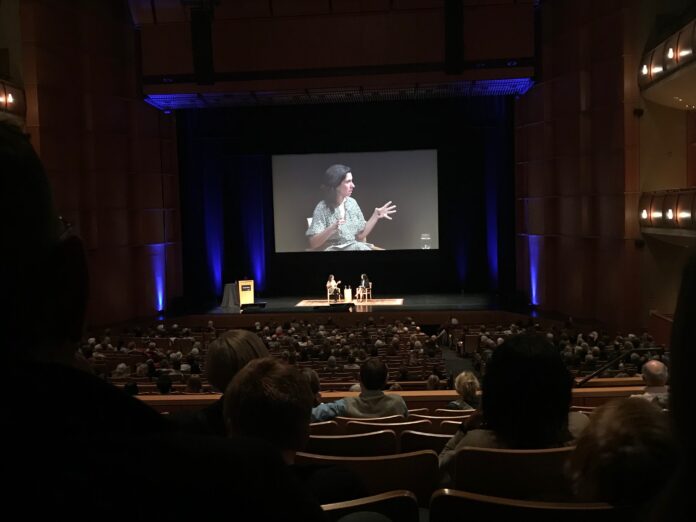Kantor discusses breaking Harvey Weinstein story, #MeToo movement, journalism career
Jodi Kantor, the investigative journalist from The New York Times who broke the story exposing the sexual harassment committed by Harvey Weinstein alongside colleague Megan Twohey, spoke at the Mondavi Center on March 4. Kantor, who covers gender and politics for The Times, discussed her experience of writing and reporting the Weinstein story, as well as the impact of the piece on the #MeToo movement.
The event started with a 45-minute speech from Kantor, followed by a Q&A session moderated by Pamela Wu, the director of news and media relations for UC Davis Health and a Capital Public Radio contributor.
Kantor began her talk with an anecdote about the days leading up to the publication of the Weinstein story and explained her initial concern that people wouldn’t care about the piece. The story, which documented 30 years of sexual assault allegations against Weinstein from famous actresses, assistants and others who had worked with him, sparked the #MeToo movement and resulted in the movie producer’s subsequent firing from The Weinstein Company.
Kantor said that she and Twohey were initially skeptical as to whether the piece would have an impact.
“Investigative journalists have to apply skepticism to everything, even our own stories,” Kantor said. Before the Weinstein story was published, Kantor said that she often asked herself, “what if nobody cares?” She went on to explain, however, that she’s “a journalist because she believes that people do care.”
After the story was published, hundreds of new sexual assault allegations appeared in the news — some against Weinstein and many more against other perpetrators both nationally and internationally. Though #MeToo is not news anymore, wrestling with sexual assault in the workplace is now a “permanent condition of all of our lives,” Kantor said.
Kantor went on to explain that the problem has no boundaries: assault allegations come from all racial, economic, cultural and political areas. She emphasized that the #MeToo era requires society to ask questions about what we’re willing to tolerate in the workplace. Kantor asked the audience if, in future years, “will we be able to say: I was there when things changed?”
To close her speech, Kantor left the audience with a mantra that she and Twohey used when trying to enlist confidence in their sources to encourage them to share information on the record.
“I can’t change what happened to you in the past,” Kantor and Twohey said to their sources while reporting, “but the magic of journalism is that if we can work together we can convert your suffering into something you’ll be proud of for a long time — you never know who you might reach.”
Currently, Kantor and Twohey are working on a book about the Weinstein story and other assault cases entitled “She Said: Breaking the Sexual Harassment Story That Ignited a Movement.” After the book is published, Kantor will return to her post as an investigative journalist at The Times.
Written by: Olivia Rockeman — campus@theaggie.org




